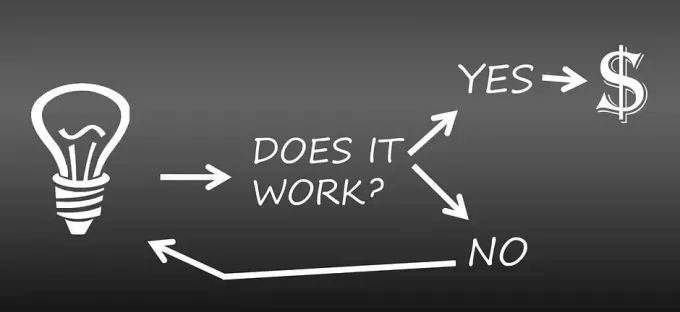For the human being, decision making It is one of the most important acts, this is because choosing to do something that could have unfavorable consequences generates conflict and doubts.
Keep in mind that the make the right choice It is done based on previous experiences, in addition each person has a way of dealing with problem solving, according to their knowledge and history.
Advertisements

In this article you will find:
Definition of decision making (What is it)
The decision making It is a clearly human capacity, it derives from the power of reason and the power of will, that is, thinking and wanting united in the same direction.
Advertisements
It is the process of analyzing, organizing and to plan looking for a specific purpose. Recurrently, human beings must choose between different options, the one that according to their criteria is the most successful.
It can be presented in different contexts: personal, family, work, social, sentimental, economic, business, etc. That is, decision-making is presented at all times, the difference lies in the way in which they are reached.
Advertisements
For him administrator or manager making decisions represents one of the greatest responsibilities that must be assumed at work level. Make the decision Correct is one of the goals of those who practice management, for this they must have certain knowledge, extensive experience in the subject and personal safety.
 How are decisions made in organizations?
How are decisions made in organizations?
Decision-making in management works alongside the four Administrative functions: Planning, organization, direction and control.
Advertisements
In many cases they are taken through two mechanisms:
- Rationality: Process where simple models are developed in which the characteristics of the problems are analyzed without emphasizing complexity.
- Intuition: It is an approach where decisions are made unconsciously, from long experience.
In other cases, defined models are used to help assertive taking.
Advertisements
Rational Model
It is one of the models most used by management, it considers human behavior with the idea that people maximize value under certain restrictions. Each person has goals and classifies his actions according to the contribution of these goals to finally select the alternative with the highest value in terms of compensation.
Steps:
- Define the problem.
- Identify the existing criteria for the decision.
- Distribute weights to the criteria.
- Develop a series of possible alternatives.
- Analyze these alternatives and select the best one.

Elements of managerial decision making
- Information: It is important to handle the aspects for or against the problem, in this way to define the limitations. If specific information cannot be obtained, the decision should be based on the information available, even if it is information at a general level.
- Knowledge: To make any decision, you must have knowledge of the circumstantial environment of the problem, in this way select a course of action. If knowledge is lacking, it is essential to seek advice.
- Experience: When a manager has made decisions constantly, with good and bad results they provide experience, information for the future, that could be used in a similar problem, from this establish a plan of action. If you lack experience, the tendency is to experiment, it should be noted that important problems cannot be solved with experiments as the risk is high.
- Analysis: It is done through specific methods, when you do not have one, you must then trust your intuition.
-
Judgment: You need to use information, knowledge, experience and analysis wisely.

Information is essential to make a good decision
Importance of decision making
It is a fundamental aspect of senior management, a good manager is one who properly manages the responsibility to make the right decisions, since they make big decisions on a daily basis that pose risks to the organizations.
Deciding involves taking a position and choosing a path to follow, which requires internal and external information from the organization.
It is a fundamental part of the planning process, it helps to maintain harmony and organizational efficiency.
A wise decision made under a good procedure will save us time, effort, energy and money. Due to technological advancement and competition, managers an organization with optimal growth and development.
Basic principles in the decision-making process
- It is important to decide well, but it does not matter if you get it right, the feeling of responsibility can lead you to think that by doing things well, everything will go as planned.
- The objectives must be identified, if you do not know where you are going, you will hardly get there. This allows you to act according to the goals or objectives.
- You must plan things that are possible to carry out, a frame of reference conditions the course of action.
- Do not deceive yourself, consider both the reasons that support the decision you have made, and the reasons that question it. Create a heterogeneous work team where there is diversity of opinion so you will not work blindly.
- Use only relevant information, this information reduces uncertainty when making a decision.
- It is normal to feel uncertainty, when making a decision you always run the risk of making mistakes, having losses and failing. Therefore, it is important to propose several scenarios and generate contingency plans for each scenario.
- Use creativity in yourself, generate different alternatives, do not go to the first one, as you develop new ideas, better options tend to emerge. The more alternatives, the higher the quality of the decisions.
- Decisions should not be judged on how effective they are, a decision can have many other kinds of consequences. Reason all the consequences that can be had with this decision and raises a field of evaluation where the negative aspects are the minimum possible.
- The decision must be followed by the action, no decision is good until it is applied, its operability is seen and the first results are obtained.
- People have feelings and these can influence decision making. Rationality has individual limits that generate the way of thinking of each individual. In decision-making, these limits must be managed by being aware of them thanks to self-knowledge.


